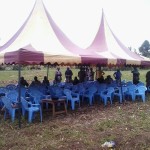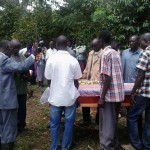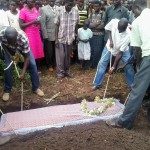Every family, community, nation and race, in one way or the other, have a set of values and practices which they adhere to and accept as part of their lives. These beliefs and traditions are what give different groups of people an unique cultural identity.
Culture is simply cumulative experience and knowledge, values, attitudes, religious practices, notions of life and death, and concept of origin of the universe. Tradition implies the handing down and transferring from generation to generation, either through written records or oral delivery.
Let us cast our spotlight in the continent of Africa. Africa is made up of not less than 53 nations, and each nation is further divided into many small groups known as tribes. Each tribe has its own culture and traditions, which distinguish it from other tribes. In the nation of Kenya, there are total of 43 small tribes which makes the people of Kenya. Each tribe adheres to different and unique cultures and traditions.
Despite all their differences, the tribes have something that they share in common–the rites of passage. Every tribe has a certain evolution, from birth until death. Rites of passage are a very important part of many African tribes; they are considered to be sacred and vital for the survival of the community and identity.
“Rites of passage play a central role in Africa socialization, remarking the different stages in an individual development, as well as that person’s relationship and role to the broader community.” (Alik Shahadah)
There are four important rites of passages in Africa communities, namely;
- Birth
- Puberty
- Marriage
- Death
Today we will focus on death, funeral and burial in African culture and traditions. These rites are among the most sacred and significant in many of Africa’s communities.
African view of Death
African tribes view death as a final rite of passage where the soul is passing into an invisible and continuous phase of existence. Death brings both sorrow and joy to the community. Communities mourn because a member is finally making a sacred transition into the spiritual realm; this member will never be seen again by mortals. These are periods of great distress and bitter lamentation from the community, especially women and children.
On the other hand, is the great moment of joy and gratitude, and is viewed as a blessing for one member to be called by the ancestors to join the company of ancestors, and be among the spiritual protectors and helpers of the community. Death is a sacred journey from physical reality into spiritual world. That explains why most communities have special preparations for the dead; the process is very crucial and vital. In ancient cultures and traditions (such as ancient Egypt) people would be buried with different objects to assist them in the next life, such as weapons, tools, clothes, money and precious items to take as gifts to the ancestral spirits.
Funeral ceremonies
Funerals are taken very seriously. They are sacred, unique, socially binding and expensive affairs. There will be long or short mourning periods for the deceased, based on their age, gender, and prominence in the community. For a child it may take only three to four days of mourning; for women and “ordinary” men, it will take at least a week’s time. For prominent and respected men, like chiefs, senior elders and spiritual leaders, the funerals often take at least two weeks time.
During the funeral ceremonies, lineage rituals are performed and gifts and donations are offered to the family of the deceased to help with the heavy costs associated with the ceremonies. Slaughtering of animals for meat is a very common tradition during funerals. For the prominent and respected members, not less than 10 to 20 bulls will forfeit their lives to feed the mourners and please their ancestors. Unfortunately, this extravagance leaves the families more miserable and poverty-stricken after the funeral ceremony is over. But despite this, it is a sign and mark of respect for the dead, hospitality for the mourners, and reverence for the ancestors.
Burial Ceremonies
Burial ceremonies are done based on the faith and religion of the deceased. If the deceased was a traditionalist, his burial will be conducted in traditional ways; if they were Christian, it will reflect those beliefs, and if they are Muslim, then it will be according to Muslim traditions.
Traditional burials are always led by elders and traditional priests, who will pour libation and offer food to the ancestral spirits, accompanied by rituals and sacred rites performed to express the appreciation and honor for the life of the deceased. Chanting and dancing to invoke the spirits is a significant part of the traditional burial ceremonies. Is good to understand that all these rituals are to venerate the ancestors but not to worship them. Ancestors are not gods, but rather are perceived as the spirits that link the living men with a living God.
In a Christian burial ceremony they will sing hymns, offer prayers at the chapel with the coffin placed in the middle of the chapel. Sometimes the service will be done at the funeral home’s chapel or in the cemetery chapel. The priest or the pastor will lead the mourners in worship and glorify God for the life of the deceased, then preach a sermon of comfort to encourage the deprived family. Special candles may be lighted and passed around, or an icon of Christ or one of the saints may be placed in the hands of the deceased. After the sermon is over, friends and relatives will be allowed to view the body and offer the words of comfort to the family, then the coffin will be carried to the burial site. The priest will make a final prayer before the body is lowered into the grave.
Muslim burial is very brief and, unlike other traditions, is done immediately after the death occurs. Muslims are encouraged to remain calm and composed after they hear the bad news of death. They will close the eyes of the deceased and cover the body with a clean piece of sheet. Its is forbidden for mourners to wail, scream or lament. The deceased will be washed carefully by one of the family member with clean and scented water. The body will be wrapped in a clean, white sheet, (known as kafan), then transported to the final prayer site (salat-I-janazah). These prayers are often done in open places; in a courtyard or public square, but not inside the mosque. The local Imam will lead the mourners in prayer, which are silently recited. The body will then be taken to the cemetery for burial. While all the members of the community are allowed to attend the prayer ceremonies, only the men of the community are allowed to accompany the body to the burial site. After the burial is done, the relatives and friends of the deceased observe a three- day mourning period.
Currently, Kingdom Driven Ministries does not use general funding to provide for funeral expenses; however, we have great compassion on those who struggle to provide an honorable burial for a relative. With the cultural tradition of not refusing anyone to attend a burial (and having to feed everyone who comes), the expense is great. When one of our own brethren is responsible for the bulk of funeral expenses, we actively solicit special donations specifically for that need and have our deacon(s) assist with organizational details. If one among our brethren dies, we also will make sure one of our ordained leaders is available to preach at the burial service.



